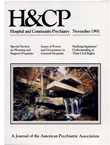Factors Affecting SSI Support for Sheltered Care Residents With Serious Mental Illness
Abstract
The complexity of Supplemental Security Income (SSI) regulations and procedures allegedly inhibits eligible persons with serious mental illness from obtaining and retaining support. This study examined factors affecting continued 551 support among 393 sheltered care residents with serious mental illness ten years after an initial positive eligibility determination. At follow-up between 1983 and 1985 of 225 cohort members, 182 were receiving SSI benefits, 28 were eligible for SSI due to their low income but were not receiving benefits, and 15 were income-in-eligible. The financially needy were most likely to receive SSI support for longer periods of time, and the most severely disturbed spent the least amount of time on SSI. income-eligible nonrecipients were likely to be young, transient patients using emergency room services as opposed to receiving outpatient counseling.
Access content
To read the fulltext, please use one of the options below to sign in or purchase access.- Personal login
- Institutional Login
- Sign in via OpenAthens
- Register for access
-
Please login/register if you wish to pair your device and check access availability.
Not a subscriber?
PsychiatryOnline subscription options offer access to the DSM-5 library, books, journals, CME, and patient resources. This all-in-one virtual library provides psychiatrists and mental health professionals with key resources for diagnosis, treatment, research, and professional development.
Need more help? PsychiatryOnline Customer Service may be reached by emailing [email protected] or by calling 800-368-5777 (in the U.S.) or 703-907-7322 (outside the U.S.).



